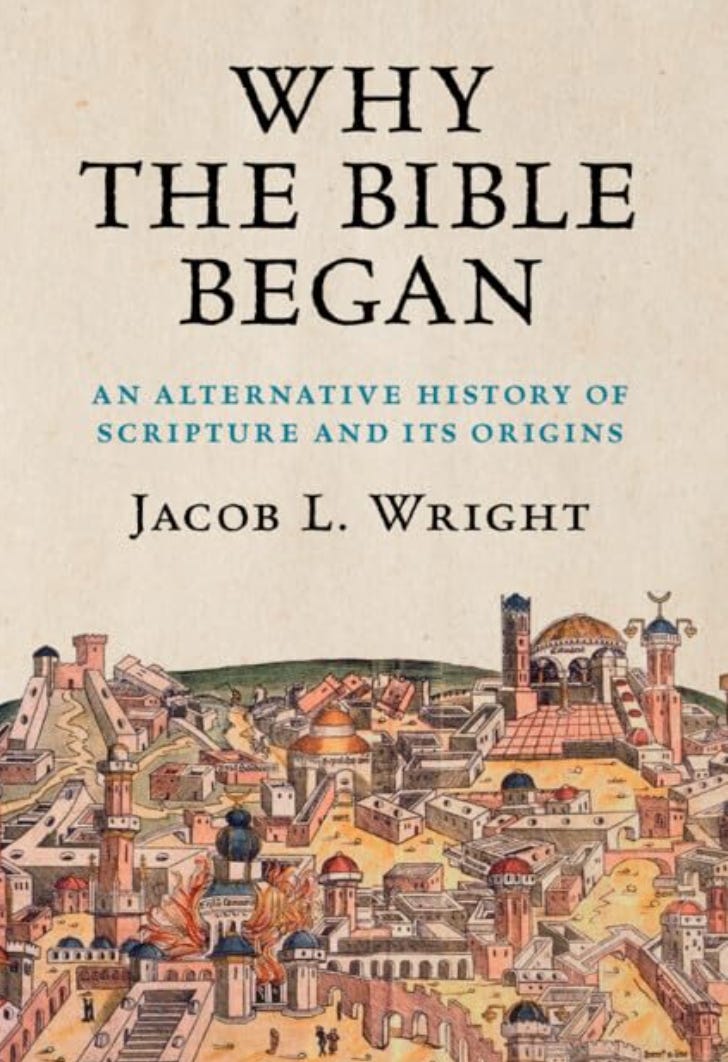Why the Bible Began?
I don’t know the best word for Jacob L. Wright’s new book, Why the Bible Began: An Alternative History of Scripture and Its Origins. Here are some expressions for this book:
A history of Israel (along with a lot of history about more than Israel)
An exposition of salient ideas in the Bible
A sketch of important figures in the Bible
An introduction to the historical-critical method
The historical-critical method in a new key
A theologically rich and politically savvy sketch of biblical texts and ideas
A deconstruction of lots of what many of us think about the Bible
A deconstruction of lots of how the Bible was formed
Jacob Wright, it can be said, loves the Bible because in studying the Bible historically he brings to the surface topics (life, death, war, politics, greed, crime, arrogance, etc) that matter to all of us all of the time. Economics too.
I read this whole book slowly and carefully, underlining, marking, writing comments to myself and the world in the margins, but I can find no better insight into the book then one can find on the opening page, an abstract of the book: “the Bible is not only a testimony of survival, but also an unparalleled achievement in human history. Forged after Babylon's devastation of Jerusalem, it makes not victory but total humiliation the foundation of a new idea of belonging. Lamenting the destruction of their homeland, scribes who compose the Bible imagined a promise-filled passed while reflecting deeply on abject failure. More than just religious scripture, the Bible began as a trailblazing blueprint for a new form of political community. It's response to catastrophe offers a powerful message of hope and restoration that is unique in the Ancient Near Eastern and Greco-Roman worlds.”
Perhaps the heart and secret sauce to this book is how Wright forges upper section of the origin of the Bible following disaster and defeat, namely national disaster and military defeat. It is at that juncture in history that the bibles formation comes into view, framing a new way of understanding the people of God and how to belong to one another in community. I read this book over about a month, never wanting to put it down, but always wanting something more for the next day's reading. I'm no expert when it comes to Old Testament, or Hebrew bibles, critical study, so at times I simply had to assume the correctness of rights conclusions, but in doing so I found the entire book an adventure in theological and communal perception of how the Bible came into being. And, of course, by the word “Bible” I'm talking about what the Christians call the Old Testament.
In writing above about a historical critical method, and the critical history of Israel, based upon the Hebrew Bible, Wright isolates five “connecting competing accounts” of Israel that were formed by later scribes into a single text: (the family story: Genesis; the people’s history: Exodus 1; conquest account: Exodus 2-Joshua; national narrative: Judges; the palace history: Samuel-Kings. Only someone skilled and adept at various approaches to the critical history of Israel can evaluate this scheme. I would contend that, whatever one thinks of this scheme, reading the text slowly and understanding it gives any reader an opportunity to experience how critical history operates.
At times, I muttered aloud to myself about which portion of this book that I liked the most. And every section seemed to get better, until I got to Part IV, which did not get better, but dramatically better. In this section of the book he discusses women and the biblical agenda (matriarchs), redefining gender roles (heroes), tales of war and outsiders and allegiance (the other), sacrificial death and eternal life (soldiers), open access and public transparency and the separation of powers (prophet and priest), the sage, the poet, the queen, and then offers conclusions about nations, nationalism, and new Bibles.
The impact of a book can sometimes be measured by how many times the next books and articles cause one to return to the original book. If so, this book has had a noticeable impact on me. I’ll read it again.




Like the other commentators, your review has convinced me I need to read a book I might have just passed by without notice. It is now on my books to read in 2024.
Scot, I appreciate your openness to new or different perspectives, especially with your scholarly background.